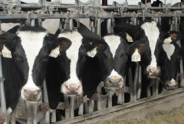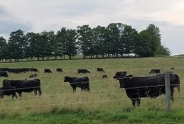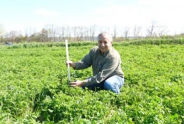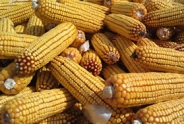Employee Development and Training Course
Event Details
Date
March 9, 2023
March 16, 2023
March 23, 2023
March 30, 2023
April 6, 2023
April 13, 2023
Time
3pm - 4pm
Location
Zoom
Host
CCE Agricultural Workforce Developement
agworkforce.cals.cornell.edu/agricultural-
Rachel McCarthy
email Rachel McCarthy
Cornell Agricultural Workforce Development has opened registration for a new online course in the Supervisory Leadership Certificate Program. Offered for the first time, "Employee Development and Training" course materials release and registration closes on March 3, 2023. Live weekly Zoom sessions will be held 3 to 4 PM EDT each Thursday from March 9 through April 13. Continuing education credits are offered. Course cost is $275 and spaces are limited.
Information and registration link for the Agricultural Supervisory Leadership certificate courses, "I hope participants will gain practical tools that they can put in their supervisory skills toolbox. They can pull these tools out and use them to build a great workplace and solve problems. Ultimately, we want farm managers to be just as confident about their ability to lead people as they are about their ability to manage farm production," said Dr. Richard Stup, Agricultural Workforce Development Specialist.
Employee Development and Training is the course you've been waiting for! Identify training needs. Understand learning styles. Design and plan learning experiences that accommodate learner needs. Develop effective training skills and techniques. Evaluate learning results and training effectiveness.
"We're always looking for ways to improve labor management and leadership skills and we encourage our employees to take courses too," said Bob DiCarlo, FaBa Farms, who took the Managing Performance course, and his employee took Organizing Work for High Quality Results. "We're focused on continuous improvement. One of the big pluses has been getting to have time to learn from people not in the same agriculture industry and to talk through real-life situations. The breakout Zoom sessions were worthwhile. It was helpful for me to talk through situations and for our employee too. It's easy to say I'm busy but pick the course that would be of most interest. When you push your comfort zone, it returns the most. We're continuing to see the importance of stepping away from daily tasks on the farm to see the bigger picture."
The Agricultural Supervisory Leadership Program includes a series of courses that help farm supervisors and managers learn and apply human resource management practices and leadership skills that foster rewarding workplaces and drive business results. Confident managers who thoughtfully apply leadership and management skills improve employee performance, develop teams, reduce employee turnover, and increase employee engagement. The six courses within the certificate series offer extensive practice and engagement activities to build confidence and skill sets.
Who should attend?
This course, and the whole certificate program, is appropriate for both new and experienced farm supervisors and managers, and those preparing to become supervisors. All participants learn leadership concepts and practice skills that improve their ability to build a positive workplace and get results through leading others.
How to attend?
The course is taught online, but you can still actively engage with other learners. Watch prerecorded presentations on your own schedule, and engage with classmates and instructors during weekly, live discussion sessions. Participation in the live sessions is highly encouraged and provides a valued opportunity for peer-to-peer learning and networking. Continuing education credits are offered.
Course instructors include:
- Richard Stup, Cornell Agricultural Workforce Development Specialist
- Elizabeth Higgins, Ag Business Management/Production Economics Extension Specialist with the Eastern New York Commercial Horticulture team
- Libby Eiholzer, Bilingual Dairy Specialist, Cargill
- Bob Milligan, Cornell University Professor Emeritus
- Kaitlyn Lutz, Bilingual Dairy Management Specialist
- Jay Canzonier, Cornell Agricultural Workforce Development Extension Support Specialist
Direct questions to Rachel McCarthy, Agricultural Supervisory Leadership Coordinator, at rachel.mccarthy@cornell.edu.
Courses in the Supervisory Leadership certificate program can be taken in any order and include:
- Transitioning to Supervisor: Develop essential communication skills and manage conflict. Lead a multi-cultural team. Build an effective workplace culture.
- Organizing Work for High Quality Results: Create an efficient and high-performing workplace. Develop clear expectations and standard operating procedures. Delegate effectively. Diagnose and correct performance problems.
- Managing Performance: Understand motivation. Harness the power of performance feedback and coaching. Build clear and effective workplace communications. Set safety expectations. Conduct effective performance improvements.
- Ethics and Employment Regulations for Supervisors: Implement responsible and ethical labor practices and understand why this matters for agriculture. Recognize and prevent sexual harassment. Understand and follow minimum wage and overtime laws. Implement Equal Employment Opportunity laws to prevent discrimination and harassment. Use an employee handbook. Handle employee discipline and termination.
- Employee Development and Training: Identify training needs. Understand learning styles. Design and plan learning experiences that accommodate learner needs. Develop effective training skills and techniques. Evaluate learning results and training effectiveness.
- Staffing and Organizing Your Team: Develop job descriptions. Learn how to find potential employees, interview and select the right people. Implement new hire documentation, employment authorization, and onboarding: bringing new employees into the business successfully and productively.
Cornell Agricultural Workforce Development's mission is to help farms and agribusinesses build committed and effective teams who will carry out the important work of feeding local families and the world.
Upcoming Events
El "Break" Info-Lechero 2025
September 3, 2025
September 10, 2025
September 17, 2025
September 24, 2025
October 1, 2025
October 8, 2025
October 15, 2025
October 22, 2025
October 29, 2025
November 5, 2025
Dairy Spanish Webinar Series, free but registration required. Only available in Spanish.
Corn Silage Dry Down Day
September 12, 2025
Fort Plain, NY
Free event. No registration needed
Mental Health First Aid Training
September 19, 2025
Cobleskill, NY
Free training
Announcements
Sign Up for Our Weekly E-Newsletter
We send out a bi-weekly e-newsletter that has announcements, upcoming programs, and opportunities for you! Registration is quick, easy, and free. Click here to sign up today!Farmers Can Join MeatSuite For Free!
MeatSuite.com is a free resource provided by Cornell University where NY meat farmers can create a farm profile and list their bulk (wholes, halves, quarters) and bundled (i.e. Grilling Bundle) meat products.Why should farmers join?
1. It's free and easy!
2. Connect with more local customers. In the past year the MeatSuite.com farm directory had 8,300 visits from New York consumers. Farm profiles get as many as 25 views per month from potential local customers. We also spotlight MeatSuite farms on social media and bring attention and purchases to farms through highlights and giveaways.
How do I join?
Farmers can visit https://www.meatsuite.com/farmers/ to create a free farm profile. You must list at least one product for your farm's profile to go live. You'll also have access to Cornell's free Meat Price Calculator, a helpful tool for pricing your meat to make a profit.
While you're on MeatSuite, check out the "Creating Consumer-Friendly Bulk Meats" publication on the log-in page. It has tips on how to create bulk meat products that are easier for first-time buyers to say "yes" to.
If you have any questions as you create your farm profile or products, we're here to help! Please email Matt LeRoux at mnl28@cornell.edu.





